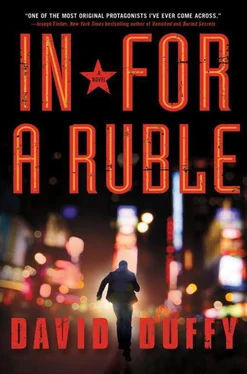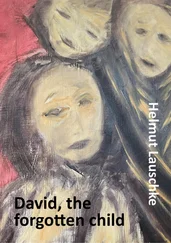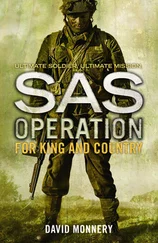Sasha met me for dinner a few days after I arrived.
“I never should be telling you this,” he said. “You’re not ready, nobody could be. There’s a chance I’m not right, but I can’t follow up. It’s a new world at Lubyanka since I got back. Everything’s locked up tighter than ever. You need special clearance. Orders from the Kremlin. Some say from the man himself.”
The man would be Comrade Putin, whose positions in the New Russia have included president and prime minister, but whose power is more akin to that of general secretary of the Communist Party in the old days. Even after he entered politics, Putin remained first and foremost a Chekist.
Sasha slid a piece of paper across the table and stared into his glass. “It looks like we were wrong, and this is your father, your real father.” He didn’t want to say it. I can’t blame him.
I unfolded the paper.
Two initials and a name.
L. P. Beria.
* * *
I spent Christmas back in New York, researching what I could about Lavrenty Pavlovich Beria, thinking about Aleksei and trying not to think about Victoria. Not necessarily in that order. It’s funny—growing up in the Gulag, there weren’t any holidays to celebrate. When I was an adult in the Soviet Union, Christmas wasn’t observed. When I moved to New York, I lived alone, and I didn’t pay much attention. But this year, for the first time, as I walked the streets amid the holiday decorations and preparations, I felt lonely. I wasn’t sure what to make of that. For all I knew, Victoria didn’t even like Christmas. She’d lived alone much of her life too. All I wanted was to be able to ask her.
Progress with Aleksei might have cut the blues, but he’d walked out on our second dinner together when he found out how deeply the Cheka runs in his lineage and declined to meet again. I couldn’t fault him. The Cheka was the one Soviet institution to make the transition to so-called Russian democracy with little loss of power. What was once known as the state within the state became in many ways the state itself once Putin took power, and it ruled with the same tools it had long used so successfully—fear, intimidation, violence, and making absolutely certain its own interests came first. As an officer with the Russian Criminal Prosecution Service, which wages a form of David-and-Goliath institutional warfare against its much more powerful rival, Aleksei viewed all Chekists as enemies for life. Like many, he also blamed the Cheka for the problems with the New Russia, and he wasn’t entirely wrong. Or even mostly. I kept trying to demonstrate that my departure from the organization was complete and total and twenty years earlier, but he inherited my stubborn streak, at least on that subject.
All of which meant it was going to take time for him to figure out what he really thought of me—I understood that—but I wasn’t prepared to wait another couple of decades for the result. I understood equally well that to push it would shove him in the wrong direction. One more situation whose outcome I couldn’t do a damned thing about, which just added to the general depression.
Then there was Beria—the Soviet Union’s most brutal butcher, head of the Cheka from 1938 to 1953, serial rapist, Stalin’s favorite executioner—and the idea that he could be my father. He doesn’t look like a bad man—ski-jump nose, receding hair line, cleft chin, and rimless spectacles. Looks can be deceiving. But did I look like him ?
Since Sasha’s revelation, Lavrenty Pavlovich has taken to putting in periodic appearances in my consciousness, showing up unannounced, often in uniform, usually wearing a mocking grin. I’m not that familiar with apparitions, although lots of my fellow zeks saw them all the time in the camps. Murdered sons, daughters, or parents. Loved ones left behind. Relatives who’d vanished, just as they themselves had done. Sometimes the visions were causes of comfort, other times, fear. Beria didn’t comfort, he didn’t scare either. There was a time when the mere mention of his name could cause unchecked terror, but he’d been dead for sixty years. Old ghosts aren’t that scary. Mostly he mocked—with well-chosen words and that grin. The first few times, I was mildly concerned with my state of mind, but I put the visions down to too much vodka and the head injury I’d given myself last summer when, a day after being beaten senseless, I’d cracked my skull on a glass coffee table. After the first few appearances, Lavrenty Pavlovich and I reached our own détente—he showed up when he chose, and he mostly left when I told him to.
Information on Beria the man was hard to come by, beyond the essential facts of his career. Head of the Georgian secret police, secretary of the Communist Party in Georgia, then for the Transcaucasian region, member of the Central Committee of the Communist Party, deputy head of the People’s Commissariat for Internal Affairs (NKVD), member of the Politburo, commissar general of state security, overseer of purges, murders, and crimes too numerous to count. Stalin is supposed to have introduced him to Roosevelt at Yalta as “our Himmler.”
Beria hasn’t received the attention most mass murderers get, and what was out there wasn’t necessarily reliable. A couple of biographies (one overly florid, the other too dry), some academic papers, but not much that told me about the man. I could have gone back to Russia, but I’d find less information there. The current powers are schizophrenic in their treatment of history, particularly the Stalin era. On the one hand, they want it remembered as a great patriotic age—the time when the Soviet Union became a major twentieth-century power and, at enormous sacrifice, turned the tide of the Great Patriotic War. This is true, so far as it goes. But buying into Stalin as icon requires turning a blind eye to the greatest crimes against humanity this side of Nazi Germany, crimes that Russia as a nation—Russians as a people—have never come to terms with. So we try, with the active participation of our leaders, to sweep them under the rug, hoping in time, I suppose, that the world will forget. One reason there’s little information available about the perpetrators, including Comrade Beria, and much of what there is has been locked away.
I badgered Sasha periodically by phone and e-mail, but the answer was the same—no clearance, no access. I was stuck in genealogical limbo, hoping for the opposite of a smoking gun. No way to move things forward with Aleksei until I found it—or didn’t. Unable even to look, I got more and more gloomy.
Seeking diversion, I pestered Foos about the Basilisk and Victoria. He just shook his curly mane and ignored me. He’s good at that. But I got on his nerves and that’s one reason he took me to see Leitz.
* * *
“I’m not a computer expert,” I said to Leitz.
“I got that end covered,” Foos said.
“A bunch of firms do this kind of thing for a living,” I argued. “Network protection, cyber-security, hackers for hire. This is right up their line.”
“I don’t know them and I don’t trust them. There’s also the issue of publicity. I don’t want any. Foos says I can trust you.”
“‘Trust’ and ‘qualifications’ have different definitions in the dictionary.”
Leitz shook his head. “Foos knows everything anyone needs to know about computers. He tells me you’ve been in jail and you used to be a spy. You have a shot at knowing how someone like this thinks. That’s the most important qualification I can think of.”
I looked at Foos. “How much did you tell him?”
“The basics.”
Leitz said, “He told me you have what we call a checkered past—in and out of jail in the Soviet Union until you caught the attention of the KGB. You speak half a dozen languages, a valuable skill. You served twenty years in the most elite department of one of the world’s most successful espionage organizations, including several tours here in the States. He says you have an unconventional mind and you’re choosy about your clients. He hinted he might have some leverage in that regard.”
Читать дальше












